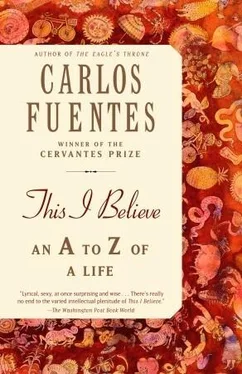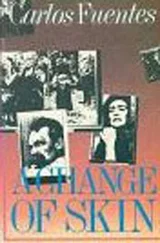“Non sunt multiplicanda entia praeter necessitatem” (“Entities should not be multiplied without necessity”). At the height of the Middle Ages, William of Occam (1280–1349) made this statement, known as “Occam’s razor,” possibly the most radical defense of man’s worldly experience as one that is complementary to time, space, and even the metaphysical heaven. Time and space are not independent of experience. The sky (God) supports the presence of human matter, neither condemning nor contradicting it. For this reason, Occam tends to be viewed as the distant but definitive father of scientific experience. Without Occam, neither Copernicus nor Galileo would have dared to divorce reason from faith, the experience of science from the experience of God, to the degree of his more radical descendants, the Occamists, who not only separated Church and State but regarded with suspicion — and even condemnation — a God that had deceived us.
I use this brief explanation as a way of establishing humanistic knowledge and ethics as the root of all experience (and that includes divine experience). I should mention, however, that this does not ascribe absolute or — much less — divine powers to human experience. To believe that would be to succumb to the sin of pride and expose oneself to the tragic consequences of defeat, disillusion, and deception. Experience is human, and it is necessary. But is it free or is it predetermined? How is it free and how is it predetermined? These questions reveal our existence because they pull together, in one fell swoop, all that constitutes the manner in which we live our lives.
Experience is desire, eagerness, or a project to be realized— either in and of itself, in the world, in my inner self or “I,” or in other people. It encompasses a great deal. Does it harvest too little? Who does not believe experience to be supremely valuable, almost synonymous with life itself: the experience of love, of friendship, of work, of creation, of power, of joy? But experience also means pride, shame, ambition, fear. And pleasure. And hope.
Damaging experiences force us to ask ourselves if we must get to the root of what caused the experiences in order for our wounds to heal. Positive experiences allow us to maintain the hope that good things will happen again, that there will always be something else.
Nevertheless, experience itself — good or bad — makes sure to remind us that, time and again, we will fail to rise to the opportunity of the day. We will turn our backs on those who need our attention, we will not even listen to ourselves. Time and again, what we thought to be permanent will prove to be fleeting. Time and again, what we imagined to be repeatable will never occur again.
This is because experience, like Galileo’s earth, moves; it changes from one place to another and its most profound force is desire. Borges describes the object of desire as simply another desire. The son of a dreamer does not know that he himself is being dreamed; the father’s fear is that his chimerical scion will discover that he is not really a man but rather a projection of the dream— the desire — of another man. This baffling situation is concluded when the father discovers that he too has been dreamed by someone else. That is, desired by someone else. In Balzac, as I mentioned earlier, the object of desire is a fetish — the body of a woman and the skin of a wild ass, both of which fulfill the desire of their owner.
Balzac in The Wild Ass’s Skin, Freud in The Interpretation of Dreams, Borges in The Circular Ruins. All offer resounding testimony of the relationship between experience and displacement.
To displace: to move. Displacement: abandonment of the place. Movement, relocation, change, mutation, transfer: money circulates, the hero rises to greatness, the adventurer travels, the conquistador pushes onward and his ships displace tons of water and will and passions and dreams. Displacement: the distortion of the visual image through the inversion of its normal coordinates. Left and right, above and below, occidental disorientation and Deep South and Far West and rudderless North, or rather new, Freudian, disorientation and displacement as dream-activity, the dream-work that is comparable to that of the novel: omission, modification, reorganization of material, substitution for satisfaction, change of the object of desire, the sublimation of perception, the identification and nomination of things, the disguise of the erotic dream projected as a social dream, the masquerade of condensed social reality in the abbreviation of a love-dream. Exorcism of the nightmare. Triumph of the replaced allusion. Translation from immediacy to mediacy. Forms of movement of surface but also of depth: trips around my room, trips to the center of the earth, the trips made by Ulysses and Phileas Fogg, but also the trips of Proust’s narrator and Kafka’s insect: displacements toward the lighthouse, the magic mountain, but also behind Alice’s looking glass and into the garden of forking paths.
Occam asks us to look beyond the notion of movement as the mere reappearance of something that has moved to a new place. Borges, Balzac, and Freud, on the other hand, offer us proof of experiences that require displacement, movement from one place to another (spiritual or physical), but always through a transformation, a metamorphosis. Of what? Of experience in destiny.
To say it is easy, whereas to do it is more than difficult (though it is that, certainly) but complex. Transforming experience into destiny implies, for one thing, desire. But desire, in turn, opens up like a fan of possibility. It is the desire to be happy. A desire that the Enlightenment consecrated as a right, most explicitly in the founding laws of the United States: the pursuit of happiness. And while there are philosophies that see happiness as nothing more than the sister of passivity, the Faustian culture of the Western world, imposing and imperious, suggests that we act so that we may be happy. The experience of action is the condition required for arriving at happiness. But that action is going to encounter a multitude of obstacles. Comparable to Ulysses’s voyage, the odyssey of the search for happiness will navigate perilously through Scylla and Charybdis, hear the siren song, frolic in the arms of Calypso, run the risk of transforming the thing it searches for into its opposite: the angel into the pig. We will see and be seen by the fearsome eye of the giant Cyclops. And we will return home to confront the suitors, the usurpers of all that we consider to be ours.
Active experience will encounter evil. And the bad thing about evil is that it knows goodness. Good, because of its innate goodness, exists within the innocence of only knowing itself. Evil has a better chance of winning, then, because it knows both good and evil. The experience of good is caught by surprise by evil, just like the cowboys caught by the Indians in the canyons and gorges of the Old West. Our dilemma is that in order to conquer evil, good must know evil. Know it without exercising it. Is this a demand fit only for saints? Or do we have ways of knowing evil without exercising it?
As a Faustian, Western male, I have a difficult time understanding and practicing the Eastern philosophies that know how to conquer evil passively. The malignant history of the age I live in leads me actively to oppose any and all assaults on liberty and life. But I am not unaware of the fact that the energy expended to achieve goodness is comparable to the energy expended to achieve evil. For the disciplined creator — and that could mean artist, politician, entrepreneur, worker, professional — it takes as much energy and experience to achieve good as it does to lose it entirely. And those of us who have witnessed drug addiction at close quarters know that it is an endeavor that demands as much energy, will, and cunning as does painting a mural, administering a company, or performing a quintuple bypass.
Читать дальше












